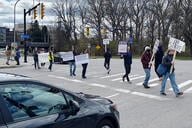You have /5 articles left.
Sign up for a free account or log in.
The National Labor Relations Board on Friday reversed course once again on graduate assistant unions at private institutions, signaling support for these kinds of bargaining units.
In its surprise announcement, the board said it would formally withdraw a Trump-era proposed rule regarding graduate and undergraduate student workers. That rule, to be withdrawn today, would have declared students who are financially compensated in connection with their studies nonemployees under the National Labor Relations Act and therefore exempt from NLRB oversight.
Under such a rule, with no legal recourse before the NLRB, student unions would have been wholly dependent on their administrations to recognize them voluntarily. This happens sometimes, including at New York University in 2013. But it is not common. Many institutions continue to argue that student workers are students, not employees entitled to collective bargaining rights. Student assistant union rights at public institutions are governed by state law.
Student workers, especially graduate students, counter that they carry out many of the same day-to-day teaching and research duties as postdoctoral fellows and faculty members, in addition to their studies. As an indispensable part of the university enterprise, these students say, they should be able to bargain collectively for better working conditions.
This is the case at Columbia University, where student workers who have been bargaining for a first contract for two years are planning to go on strike today, indefinitely. Dilip Ravindran, a Ph.D. candidate in economics at Columbia and organizer with its United Autoworkers-affiliated student union, said Sunday that the NLRB’s announcement was “encouraging” -- and comes at an opportune time.
“I think Columbia’s strategy, and lot of other universities’ strategies, have been to wait around to benefit from Trump’s labor laws for the last four years, and it’s really good they don’t have that out now,” Ravindran said. “It makes our strike a little more definite in its power, because Columbia can’t keep waiting and hoping that this rule is going to get put into place. They have to take this seriously.”
Columbia did not immediately respond to a request for comment about the strike and the NLRB’s decision. Negotiations continued through Sunday evening.
‘A Huge Step Forward’
Graduate student unions beyond Columbia celebrated the board’s announcement. Northeastern University’s graduate employee union, which is also affiliated with the United Autoworkers, tweeted for example, “This rule was an unjust attack on our right to organize, plain and simple,” and, separately, “This is a huge step forward.”
Graduate student organizers at Northwestern University said in a statement that the decision bolsters their efforts "to organize and win a union that will give us a seat at the table to fight for fair wages, expanded healthcare, independent grievance procedures, more robust childcare support and so much more." The specter of the rule didn't make those goals impossible, they said, but it made things "trickier."
The NLRB has historically flip-flopped on the graduate student union issue, revisiting it on a case-by-case basis. The proposed rule would have made the board’s stance more permanently anti-student union.
“The board has decided to withdraw this rule-making proceeding at this time in order to focus its limited resources on competing agency priorities, including the adjudication of unfair labor practice and representation cases currently in process,” the NLRB said Friday.
Even as it was good news for graduate student unions seeking recognition from or bargaining contracts with their administrations, the board’s announcement seemed to downplay the urgency of the graduate employee issue. But member Lauren McFerran, who was recently appointed board chair by President Biden, tweeted her own, pro-student employee take on the decision, saying, “In Columbia University, the board correctly held that student employees are workers deserving the full protection of our labor laws. The withdrawal of this proposed rule will ensure that student workers can continue to join together to pursue better wages and working conditions.”
McFerran’s comment about Columbia, in particular, was a reference not to the planned strike but to an Obama-era board decision in favor of the graduate student union there. In that 2016 decision, which was unexpectedly broad in scope, the board not only affirmed the right of graduate teaching and research assistants to organize but also that of some undergraduate student workers.
The decision was about Columbia but led to union elections on a number of private campuses. According to a November analysis from the National Center for Collective Bargaining in Higher Education and the Professions at Hunter College of the City University of New York, there are 16 new graduate student employee bargaining units since 2012, 11 of them at private institutions, with over 15,600 newly represented student employees. Most of these private unions were recognized after the 2016 NLRB decision about Columbia. Eight private universities now have contracts applicable to graduate student employees, according to the center.
New organizing came to something of a halt during the Trump administration, however, with more NLRB seats going to less union-friendly appointees. Some graduate assistant unions withdrew their bids from NLRB consideration as not to risk a reversal of the Columbia precedent. Existing unions in some cases refrained from filing unfair labor practice claims for similar reasons.
The proposed rule against graduate employees, announced in 2019, proved another major obstacle. Graduate student unions from different campuses strategized together to fight the rule, including by submitting public comments to the board.
More Organizing Expected
The board’s recent announcement doesn’t mean student employee unions are totally out of the woods, as the NLRB is scheduled to have a Trump-appointed majority through summer. William A. Herbert, executive director of Hunter’s collective bargaining research center, said that until then, there is a “very slight possibility” that the current majority could overturn the 2016 Columbia decision -- but only if the issue is presented in a litigated case.
Going forward, however, Herbert said, the withdrawal of the proposed rule “provides legal stability for graduate assistant collective bargaining relationships that exist at eight private institutions.” New and continued unionization efforts by graduate assistants and other student workers can be expected elsewhere, he added.
History, Herbert continued, “demonstrates that once labor rights for graduate assistants are established, the law becomes the framework for rapid collective bargaining growth.”
At issue in the Columbia strike are several yet-unsettled union wants, including that Columbia recognize some hourly workers as part of the bargaining unit, in keeping with the NLRB's 2016 decision about the union. Other sticking points are improvements to students’ health-care packages, protections against discrimination and harassment -- including having a neutral arbitrator involved in the complaint process -- and increased compensation.
Ravindran said the university and the union already agree to grievance process for issues including late pay and reimbursement, the doubling of a childcare subsidy for graduate student assistants, and additional provisions and protections for international student workers. While Columbia previously opposed having master's and undergraduate student assistants in the union, he said, it has since agreed.
Columbia has said that students who strike will not get paid and may have to pay back some of what they’re already earned. The union has set up a hardship fund to offset these losses.
Ravindran said that as a teaching assistant, he teaches, grades and otherwise fills in holes in faculty schedules. Other members of the union teach their own course sections outright and contribute to the lab research that maintains Columbia’s cutting-edge reputation. These facts and others make a solid case for why graduate assistants are employees, he said.
“Columbia probably wouldn’t have an $11 billion endowment or be making hundreds of millions of dollars over the coming years, whatever their yearly revenues are, without us. So from that perspective, it’s clear we’re workers and important to the revenue, and deserve a much larger share of the revenue and gains.”





